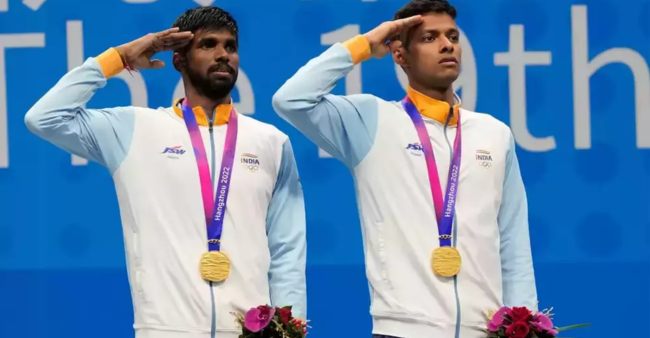Over the past decades India was nowhere in the field of sports.
In the recent Asian Games held in China, the Indian contingent produced a magnificent performance winning a record 107 medals. They bagged 28 gold, 38 silver and 41 bronze medals. From javelin to athletics to squash, hockey, badminton, Indian players triumphed. Sutirtha and Ayhika Mukherjee had a sensational win in table tennis against the world champion Chinese team of Chen Meng and Yidi Wang. To excel in sports one needs grit, determination, discipline and a fire in the belly to win for the country. The same attributes are needed for a nation to rise on the international stage. Over the last two decades India has triumphed and emerged as a major military and economic power. This in turn has positively impacted the masses of India who believe they are second to none. Over the past decades India was nowhere in the field of sports. From 1928 onwards, India only triumphed in hockey in the Olympics, which did bring pride to Indians but they wanted more. There were individual heroes who proved what Indians wanted to confirm, that they were second to none. There was a deep yearning for this proof as centuries of colonisation had suffocated a nation and civilization. European colonialists had hammered in the idea that the people they had colonised were inferior and backward. This was true also for the Africans who were colonised. In a way sports opened up an opportunity for the so-called inferior races to prove that they were not only as good but better than the colonisers. In 1958, Milkha Singh won two gold medals in the Asian Games in the 200 m and 400 m sprint events in Tokyo. He also won a gold medal at the Commonwealth Games in the 400 m race held in Cardiff, Wales. He came to be known as the “Flying Sikh”. He became a legendary figure who inspired the whole nation. P.T. Usha a multiple Asian Games gold medallist and fourth place finisher in the Los Angeles Olympics 400m hurdles final too inspired Indian women to excel in sports. She has recently been elected as the first woman president of the Indian Olympics Association.
Just as Milkha Singh inspired the Indian nation, in another continent the “Flying Sikh” galvanised the Indian diaspora living in East Africa. In 1965 Sikh brothers Joginder and Jaswant Singh won the world’s toughest car rally. Known as the East African Safari Rally it was dominated by the Europeans. The Indian community had lived in Kenya for over a hundred years under British rule. The victory by the Sikh brothers sent the Indian community and the Kenyans into a frenzy. Yes they could beat their European masters and they were second to none. Later on, Shekhar Mehta of the famous Nanji Kalidas Mehta family from Uganda won the rally five times, a record that has not been broken. In 1968, a Kenyan, Kipchoge Keino who used to run four miles barefoot to and from school won a gold medal in the1,500 m race at the Olympics in Mexico. It was widely believed that the race would be won by the American star Jim Ryan. Kipchoge Keino outpaced Jim Ryan and inspired a generation of Kenyans and challenged perceptions about race. The confidence that the new India exudes on the world stage has also impacted the confidence of the Indian cricketers. Cricket is a game of aggression, sledging and a body language that tries to undermine the opponent. Though India has had world class players the Indian team as a whole would not react to the opponents’ aggression. All that has changed in recent years. Players like Virat Kohli and many others can give back as much as they get and more. The new generation is not playing second fiddle to anyone.
Hearing the national anthem sung by over 13,000 people at the Narendra Modi stadium in Ahmedabad during the India-Pakistan match on 14 October 2023 sent a message that India is in a good place and raring to scale greater heights.
www.nitinmehta.co.uk

